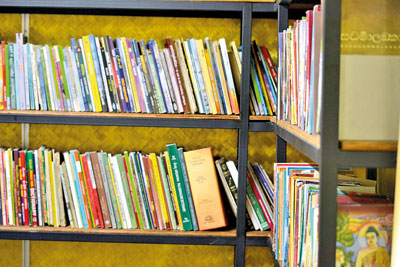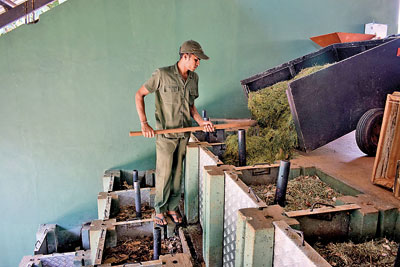Sustainability, the way forward for Sri Lanka tourism
DAMBULLA – While sustainability is one of the key concerns that countries globally are looking at today, it has become one of the tip off points when tourists choose destinations to travel. Hotel chains taking sustainable measures to protect the environment and being responsible towards preserving nature are significant aspects that travelers take into consideration.

Jetwing's community library
Sri Lanka is slowly moving into the culture of adapting to sustainable measures, but it has not begun on a large scale. Hotels in Sri Lanka are getting into the habit of implementing sustainable measures whereas it is one of the foremost ways forward for Sri Lankan hospitality and tourism sector to thrive in the future, says Hiran Cooray, Chairman of Jetwing Hotels.
He was speaking to the Business Times during a media tour to the Jetwing Lake and Jetwing Vil Uyana in and around Dambulla last weekend.
He said, “People need to be socially responsible and give back something in return to the environment that we live in and it’s not very difficult to adapt to sustainable standards. It’s a long term investment that people in the country must embark upon to make Sri Lanka a better place for living. It is the way forward to attract tourists to visit Sri Lanka and explore the natural beauty of the country.”
Sustainability starts with water being served in glass bottles instead of plastic containers, which is where the tour to Jetwing Lake began from Colombo.
During the media briefing at the Jetwing Lake in Dambulla, Mr. Cooray stated, “This is a flagship hotel for the energy side of sustainability with the use of technology.
Huge investments have been made towards sustainability and some of them cannot be justified. They are long term investments. Solar power plants are a long term investment where we have bought power for the next 25 years. There is a risk element that comes into this, it is the commitment, love and passion people have for the industry,” Mr. Cooray expressed while adding that everything is becoming guilt-free today.
Jetwing Hotels, Director-Engineering, Jude Kasthuriarachchi did a walk-through of Jetwing Lake explaining how systems are put in place to achieve sustainable measures.

Organic waste management
The main energy source at Jetwing Lake is biomass while grid and solar electricity are the second and third in use. 2,600 kg of cinnamon wood or compressed saw dust is used per day to produce 2,000 kg of steam per hour. By this method 92,800 litres of diesel and 250 metric tons of carbon dioxide are eliminated per year. Electricity saving compared to a conventional chiller is greater than 90 per cent which accounts for 1,450 kwh per day. Also 90 solar thermal panels are installed with a capacity of 300 kw that supplies 35-40 per cent of total electricity requirement and generates 1,350 kwh. The hotel has a 100 per cent hot water requirement through the renewable sources where biomass boilers are used during the night and solar panels during the day.
100 per cent of wastewater generated is treated and reused onsite for irrigation and cooling towers. On average 3,000 cubic metres of wastewater is treated monthly.
Single use plastics are phased out while all waste sources are segregated and inventoried prior to disposal. Dry waste is sold for recycling.
Drinking water is obtained from two wells within the hotel, purified using sand, carbon, softener filter and UV filter and filled in glass bottles. The used glass bottles are washed in water with sodium hydroxide (caustic soda) and around 4,500 water bottles are produced monthly for in-house use. 45 kg of plastic which goes as waste per month is eliminated with the alternative use of glass bottles.
During the question and answer session of the tour, Mr. Cooray was concerned that all hotels in Sri Lanka should unite and work towards sustainable initiatives. “We don’t expect any policy makers to support us; it has happened and will continue to happen within the organisation. Green initiatives saves a lot of money and that is where all hotels must invest to stand strong in the industry,” he noted.


